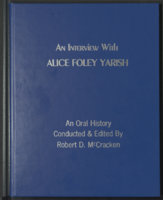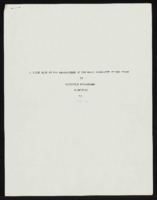Search the Special Collections and Archives Portal
Search Results

Cecia Alvarado oral history interview: transcript
Date
Archival Collection
Description
Oral history interview with Cecia Alvarado conducted by Barbara Tabach on September 15, 2020 for the Latinx Voices of Southern Nevada Oral History Project. Cecia describes her personal history, moving to the United States as a teen in the year 2000. She talks of immigration, education, and her work as the State Director of "Mi Familia Vota."
Text

Alice Foley Yarish interview, August 31, 1993: transcript
Date
Description
An oral history interview conducted and edited by Robert D. McCracken; Esmeralda County History Project; Goldfield, 1993
Text

"A Brief Look of the Development of the Black Community of Las Vegas": manuscript draft by Roosevelt Fitzgerald
Date
Archival Collection
Description
From the Roosevelt Fitzgerald Professional Papers (MS-01082) -- Unpublished manuscripts file.
Text

Deryk and Melissa Engelland oral history interview: transcript
Date
Archival Collection
Description
Oral history interview with Deryk and Melissa Engelland conducted by Barbara Tabach on May 23, 2019 for the Remembering 1 October Oral History Project.
Deryk Engelland is a professional hockey player and team spokesperson for the Vegas Golden Knights in Las Vegas. He and his wife, Melissa, discuss the events of the October 1 shooting and how the Golden Knights chose to honor the community that they were representing after this tragic event. Deryk and Melissa Engelland established the Vegas Born Foundation to honor first responders and community heroes, and the couple talks about the organization's accomplishments since its inception.
Subjects discussed include: Las Vegas healing.
Text

Mayra Salinas-Menjivar oral history interview: transcript
Date
Archival Collection
Description
Oral history interview with Mayra Salinas-Menjivar conducted by Nathalie Martinez, Elsa Lopez, and Barbara Tabach on September 20, 2019 for the Latinx Voices of Southern Nevada Oral History Project. Mayra Salinas-Menjivar is a lawyer in Southern Nevada and a graduate of William S. Boyd School of Law. She grew up in Las Vegas but describes her early years living with her maternal grandparents in El Salvador. She describes some of the aftermath she experienced regarding the Civil War in El Salvador, and recounts some testimony told to her by her mother about that particular time period. She details the differences in immigrating in the 1990s and speaks about being an undocumented student. While pursuing a business degree at UNLV she found herself working at a law firm which is where she first decided to pursue law as a career after graduation. She talks about her experiences during law school and her time helping with the law school's immigration clinic. Subjects discussed include: Salvadorian Civil War, Immigration Law, Education, DACA, William S. Boyd Law School.
Text

Kim You Taing oral history interview: transcript
Date
Archival Collection
Description
Oral history interview with Kim You Taing conducted by Vanessa Concepcion, Cecilia Winchell, and Stefani Evans on November 15, 2021 for Reflections: The Las Vegas Asian American and Pacific Islander Oral History Project. Kim discusses his upbringing in Cambodia during the Cambodian Civil War, the death of his siblings from tragedy and his father from racially-motivated war crimes, and his immigration to the United States as a refugee. He shares how he and his mother lived and worked in the United States, first in Seattle, Washington and then in Las Vegas, Nevada. Kim talks about his work in the hospitality industry in various Vegas hotels and casinos and his membership with the Culinary Workers Union advocating for Asian workers. He also discusses family life with his wife and daughter and his plans to retire.
Text

Marie Antoinette Antonio oral history interview: transcript
Date
Archival Collection
Description
Oral history interview with Marie Antoinette Antonio conducted by Cecilia Winchell and Stefani Evans on December 4, 2021 for Reflections: The Las Vegas Asian American and Pacific Islander Oral History Project. Marie reflects on her upbringing in Cagayan de Oro, Philippines and her love of music that came from her mother. Marie talks about studying music in college and traveling with her husband to Guam to become a music teacher at a Catholic school before immigrating to San Jose, California. She shares the culture shock they faced adapting to life in the United States and the higher cost of living in California, which caused the couple to move to Las Vegas. Marie discusses her life in Las Vegas, traditions and cultural celebrations she partakes in, and the American Dream.
Text
Janet Quintero (United Way) oral history interview conducted by Kelliann Beavers and Elia Del Carmen Solano-Patricio: transcript
Date
Archival Collection
Description
From the Lincy Institute "Perspectives from the COVID-19 Pandemic" Oral History Project (MS-01178) -- Community organization interviews file.
Text

Mach and Arlene Manuel oral history interview: transcript
Date
Archival Collection
Description
Oral history interview with Mach and Arlene Manuel conducted by Kristel Peralta and Stefani Evans on June 28, 2021 for Reflections: The Las Vegas Asian American and Pacific Islander Oral History Project. Mach and Arlene Manuel share the story of their overseas courtship and how they came to be together in the United States. Arlene was raised in the Philippines while Mach was born and raised in San Diego, California. Mach describes his visit to the Philippines as an adult when he began to connect more to his Filipino heritage. The couple shares how they dated for 13 years before Arlene moved to San Diego, and how the Manuel family came to live in Las Vegas in 2017 to pursue Arlene's nursing career. Arlene and Mach talk about cultural differences and discrimination, emigration and diversity, religion and identity, and Filipino food, among other topics. Subjects discussed include: Manila, Philippines; discrimination of class; and anti-Asian hate.
Text

Nympha Comacchio oral history interview: transcript
Date
Archival Collection
Description
Oral history with Nympha Comacchio conducted by Cecilia Winchell and Stefani Evans on May 09, 2022 for the Reflections: the Las Vegas Asian American and Pacific Islander Oral History Project. In this interview, Comacchio recalls her childhood in the Philippines and growing up in a large family. After attending elementary school, Comacchio immediately went to work on her father's lumber farm, performing manual labor until she was seventeen. Later, she recalls finding employment as a seamstress in Manila, where she met her first husband when she left to work in Saudi Arabia for better pay. Comacchio describes how she was able to receive a student visa to finally immigrate to the United States, where she first arrived in California. Eventually, after meeting her second husband and hearing about housing prices in Las Vegas, Nevada, they purchased a house in the city in 2000. After briefly working for the New Frontier, Comacchio began working for the Wynn and Encore, where she found out about the Culinary Workers Union and became more active in that organization. Throughout the rest of the interview, Comacchio touches on the responsibilities of being a housekeeper, the current challenges they face, and how she feels about the growing AAPI population in southern Nevada.
Text
